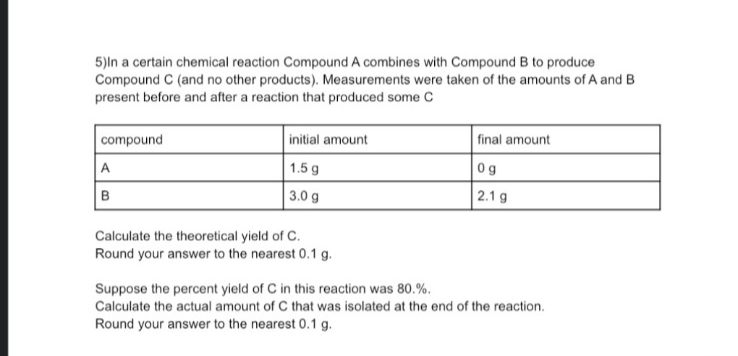5)In a certain chemical reaction Compound A combines with Compound B to produce Compound C (and no other products). Measurements were taken of the amounts of A and B present before and after a reaction that produced some C compound A B initial amount 1.5 g 3.0 g Calculate the theoretical yield of C. Round your answer to the nearest 0.1 g. final amount 0g 2.1g Suppose the percent yield of C in this reaction was 80.%. Calculate the actual amount of C that was isolated at the end of the reaction. Round your answer to the nearest 0.1 g.
5)In a certain chemical reaction Compound A combines with Compound B to produce Compound C (and no other products). Measurements were taken of the amounts of A and B present before and after a reaction that produced some C compound A B initial amount 1.5 g 3.0 g Calculate the theoretical yield of C. Round your answer to the nearest 0.1 g. final amount 0g 2.1g Suppose the percent yield of C in this reaction was 80.%. Calculate the actual amount of C that was isolated at the end of the reaction. Round your answer to the nearest 0.1 g.
Introductory Chemistry: A Foundation
9th Edition
ISBN:9781337399425
Author:Steven S. Zumdahl, Donald J. DeCoste
Publisher:Steven S. Zumdahl, Donald J. DeCoste
Chapter9: Chemical Quantities
Section: Chapter Questions
Problem 60QAP: The text explains that one reason why the actual yield for a reaction may be less than the...
Related questions
Question
Please send me the question in 20 minutes it's very urgent plz

Transcribed Image Text:5)In a certain chemical reaction Compound A combines with Compound B to produce
Compound C (and no other products). Measurements were taken of the amounts of A and B
present before and after a reaction that produced some C
compound
A
B
initial amount
1.5 g
3.0 g
Calculate the theoretical yield of C.
Round your answer to the nearest 0.1 g.
final amount
0g
2.1 g
Suppose the percent yield of C in this reaction was 80.%.
Calculate the actual amount of C that was isolated at the end of the reaction.
Round your answer to the nearest 0.1 g.
Expert Solution
This question has been solved!
Explore an expertly crafted, step-by-step solution for a thorough understanding of key concepts.
This is a popular solution!
Trending now
This is a popular solution!
Step by step
Solved in 2 steps

Knowledge Booster
Learn more about
Need a deep-dive on the concept behind this application? Look no further. Learn more about this topic, chemistry and related others by exploring similar questions and additional content below.Recommended textbooks for you

Introductory Chemistry: A Foundation
Chemistry
ISBN:
9781337399425
Author:
Steven S. Zumdahl, Donald J. DeCoste
Publisher:
Cengage Learning

Chemistry: Matter and Change
Chemistry
ISBN:
9780078746376
Author:
Dinah Zike, Laurel Dingrando, Nicholas Hainen, Cheryl Wistrom
Publisher:
Glencoe/McGraw-Hill School Pub Co


Introductory Chemistry: A Foundation
Chemistry
ISBN:
9781337399425
Author:
Steven S. Zumdahl, Donald J. DeCoste
Publisher:
Cengage Learning

Chemistry: Matter and Change
Chemistry
ISBN:
9780078746376
Author:
Dinah Zike, Laurel Dingrando, Nicholas Hainen, Cheryl Wistrom
Publisher:
Glencoe/McGraw-Hill School Pub Co


Chemistry: Principles and Practice
Chemistry
ISBN:
9780534420123
Author:
Daniel L. Reger, Scott R. Goode, David W. Ball, Edward Mercer
Publisher:
Cengage Learning

Chemistry by OpenStax (2015-05-04)
Chemistry
ISBN:
9781938168390
Author:
Klaus Theopold, Richard H Langley, Paul Flowers, William R. Robinson, Mark Blaser
Publisher:
OpenStax

Chemistry: The Molecular Science
Chemistry
ISBN:
9781285199047
Author:
John W. Moore, Conrad L. Stanitski
Publisher:
Cengage Learning